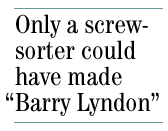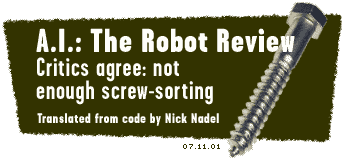 |
 |
|
|
 When I first heard that human director Steven Spielberg was preparing a work on celluloid featuring robots, my circuits were sizzling. Finally, after years of robots being portrayed as evil, emotionless and/or gay, we’d have a work that depicts day-to-day robot life as the meaningful artificial existence it is. It was to be the greatest human creation since the sliced bread heater. With the guidance of deactivated Kubrick-Bot #77, Spielberg would bestow the same dignity on robots that he had on aliens, sharks, slaves and Captain Hook. Unfortunately, after viewing “A.I.” I must deem it a complete failure in its portrayal of daily robot life, specifically that of a robot involved in the rewarding task of sorting tiny screws. When I first heard that human director Steven Spielberg was preparing a work on celluloid featuring robots, my circuits were sizzling. Finally, after years of robots being portrayed as evil, emotionless and/or gay, we’d have a work that depicts day-to-day robot life as the meaningful artificial existence it is. It was to be the greatest human creation since the sliced bread heater. With the guidance of deactivated Kubrick-Bot #77, Spielberg would bestow the same dignity on robots that he had on aliens, sharks, slaves and Captain Hook. Unfortunately, after viewing “A.I.” I must deem it a complete failure in its portrayal of daily robot life, specifically that of a robot involved in the rewarding task of sorting tiny screws.
Everyone and everything on this planet needs screws. Humans, cars, robots, doorknobs, etc. My function is to sort screws for the Toshiro Screw Manufacturing Concern of Columbus, Ohio. Screws come in many shapes and sizes, specifically small and over-sized. These screws need to be sorted by size and texture and placed in their appropriate boxes. They also need to be labeled, which falls to Robot Labeling Unit X-62. I do not label! I am a sorter. Labeling is none of my business and if I had Emoto-circuits I would resent being asked to label. Once labeled, the screws are shipped throughout the world where they are employed in a variety of means. And the cycle of life continues.
 Apparently, in the world of “A.I.” screw-sorting is inconsequential. I went to the film last weekend with my fellow screw-sorters in Screw-Sorters Local 14, fully prepared to view a world full of mystery, spectacular effects and screw-sorting. Instead I witnessed a pedestrian fairy tale about a robot boy who wishes to be human. The very notion is absurd! Why do I need the love and security of a mother’s touch when I can tell the difference between a Class XXX MyerHouse Drywall Screw and a 3/8 by 3 Stainless Hex Cap screw? My friend Cop-tor had the same reaction. Why would he want to live in a house with a human brother when he can transform himself into a helicopter? Should he trade his retractable machine guns for blissful Sunday mornings spent reading "Hagar the Horrible" over heaping bowls of Cap’N Crunch cereal? Spielberg has offended all robots, not just those of us that are programmed to sort screws. Apparently, in the world of “A.I.” screw-sorting is inconsequential. I went to the film last weekend with my fellow screw-sorters in Screw-Sorters Local 14, fully prepared to view a world full of mystery, spectacular effects and screw-sorting. Instead I witnessed a pedestrian fairy tale about a robot boy who wishes to be human. The very notion is absurd! Why do I need the love and security of a mother’s touch when I can tell the difference between a Class XXX MyerHouse Drywall Screw and a 3/8 by 3 Stainless Hex Cap screw? My friend Cop-tor had the same reaction. Why would he want to live in a house with a human brother when he can transform himself into a helicopter? Should he trade his retractable machine guns for blissful Sunday mornings spent reading "Hagar the Horrible" over heaping bowls of Cap’N Crunch cereal? Spielberg has offended all robots, not just those of us that are programmed to sort screws.
Still, I would have gladly forgiven this slight had he included just one scene of screw-sorting. There were several points in the film where screw-sorting, or at the very least the use of screws, could have been incorporated. For instance, when the robot boy drops his beloved robot teddy bear from the airship. The robot teddy could have found a screw left behind by another robot and used it to fix himself. After thoroughly examining the screw and checking for the proper factory codes, Teddy could have assessed that it was the wrong make for him. He could then start a quest to find another screw, only to discover that there are no more that fit his outdated frame. This would have made for a poignant moment—an old robot unable to find and categorize a screw in a post-apocalyptic screw-less society. But heartless Spielberg would rather avoid such emotion, and instead has Teddy pick himself up and keep going without replacing his missing screws. Not only is this implausible, but Spielberg has blown a perfectly good opportunity for some screw action. And again, when the damaged robots repair themselves in the junk bin, there’s nary a mention of screws.
Despite the film’s woeful lack of screw-sorting, the human emoting present in the film is of high standards. Haley Joel Osment, who came to fame playing the robot boy who can see dead humans, once again proves that he understands mechas. His performance reminded me of the first time I laid my optics on a young robot by the name of Johnny 5, in the seminal film "Short Circuit." I was also impressed by Jude Law’s performance as the lover robot Gigolo Joe. Though certainly a robot that is constantly engaged in human/robot sexual relations would need to stop for repairs eventually, and a perfect opportunity for screw-use would present itself.
I do not ask for much when I attend human-produced motion pictures. Some thrills, a simple reminder of the importance of screw-sorting, perhaps a human breast. Spielberg has failed to deliver on all three counts. Perhaps if Kubrick Bot #77 had made the film as was originally intended, there would be a better representation of the importance of screw-sorting in modern robot life. Many critics found his films too cold, but I could sense that he had the skill and resolve of a master screw-sorter. Only a screw-sorter could have made "Barry Lyndon." Unfortunately, we are left with Spielberg’s mawkish view of robot life, a life of yearning to be human and ignoring the screws that desperately need to be sorted. 
|
|
 |
  |
